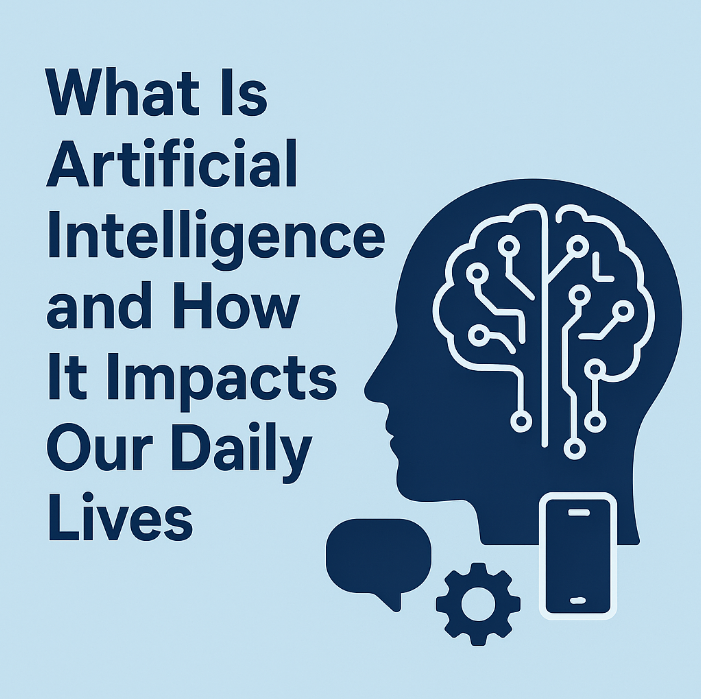Artificial Intelligence (AI) is no longer science fiction—it’s embedded in the apps we use, the devices we carry, and the systems that run our homes, cars, and workplaces. But what exactly is AI, and how is it shaping the way we live and work?
In this article, we’ll explain what AI is, explore its types and technologies, and examine how it’s already influencing our everyday lives in subtle and powerful ways.
What Is Artificial Intelligence?
Artificial Intelligence is the field of computer science dedicated to creating systems or machines that mimic human intelligence. This includes learning from data (machine learning), recognizing patterns, solving problems, understanding language, and even making decisions.
AI enables machines to perform tasks that once required human intelligence—such as recognizing speech, interpreting images, or recommending movies.
The Main Types of AI
AI can be categorized into three major types:
1. Narrow AI (Weak AI)
This is the most common form of AI today. It is designed to perform a specific task, such as:
- Language translation (e.g. Google Translate)
- Image recognition (e.g. facial detection in smartphones)
- Virtual assistants (e.g. Alexa, Siri)
Narrow AI cannot think or reason beyond its programmed abilities.
2. General AI (Strong AI)
This is theoretical AI that would perform any intellectual task a human can do. General AI would have the ability to reason, plan, learn, and communicate across different domains. This level of AI does not yet exist but is a major goal of researchers.
3. Superintelligent AI
This is a hypothetical form of AI that surpasses human intelligence in all areas—logic, creativity, emotion, and decision-making. While exciting to some and terrifying to others, we are still far from achieving this level.
Key Technologies That Power AI
Several technologies drive the current progress in AI:
- 🧠 Machine Learning (ML): Algorithms that allow systems to learn from data.
- 🕸️ Neural Networks: Systems modeled after the human brain that recognize patterns.
- 🗣️ Natural Language Processing (NLP): Enables machines to understand and generate human language.
- 👁️ Computer Vision: Allows machines to “see” and interpret images and videos.
- 📊 Big Data: Large volumes of information that feed AI systems and improve accuracy.
How AI Impacts Our Daily Lives
AI is already everywhere—even if we don’t always notice it. Here are some common ways AI influences our routines:
1. Smartphones
- Predictive text and autocorrect
- Facial recognition
- Personal assistants like Siri or Google Assistant
- Photo organization using facial clustering
2. Social Media
- Personalized feeds powered by algorithms
- Automated moderation (detecting harmful content)
- Face filters in stories or reels
- Targeted advertising
3. Entertainment
- Movie and music recommendations (e.g. Netflix, Spotify)
- AI-generated music and video summaries
- Game AI that adapts to your behavior
4. Online Shopping
- Product recommendations based on browsing behavior
- Chatbots for customer service
- Fraud detection in payments
5. Home and Lifestyle
- Smart thermostats and lights (e.g. Nest, Philips Hue)
- Robot vacuums with AI-based mapping
- Smart refrigerators that track expiration dates
6. Health and Fitness
- Wearable devices that monitor your vitals
- AI-based apps for mental health support
- Diagnostic tools that help doctors detect diseases early
7. Transportation
- GPS route optimization
- Ride-hailing apps with demand prediction
- Self-driving vehicle research and development
The Benefits of AI in Daily Life
- ⏱️ Efficiency: Automates routine tasks and saves time
- 🎯 Accuracy: Reduces human error in critical systems
- 💬 Personalization: Offers custom experiences in shopping, content, and communication
- 🌍 Accessibility: Helps people with disabilities through voice control and smart apps
Concerns and Ethical Challenges
Despite the benefits, AI also raises important concerns:
- 🧠 Bias in data and decision-making
- 🔒 Privacy issues from data collection
- ⚙️ Job displacement due to automation
- 🧑⚖️ Lack of regulation and accountability
- 🤖 Overreliance on algorithms we don’t fully understand
That’s why it’s important to develop AI responsibly, ensuring it is ethical, transparent, and beneficial to society.
The Future of AI in Everyday Life
Looking ahead, AI is expected to become even more integrated into daily life:
- Hyper-personalized digital assistants
- AI tutors in classrooms
- Augmented-reality shopping experiences
- Predictive healthcare based on real-time monitoring
- Seamless translation tools across languages
AI won’t just assist us—it may eventually anticipate our needs and act on our behalf.
Conclusion
Artificial Intelligence is not just a buzzword or distant concept—it’s a growing force that’s shaping how we live, work, and interact with the world. Whether it’s powering your smart speaker or recommending your next movie, AI is already part of your everyday routine.
Understanding its basics and staying informed about its benefits and risks is essential as this powerful technology continues to evolve.
